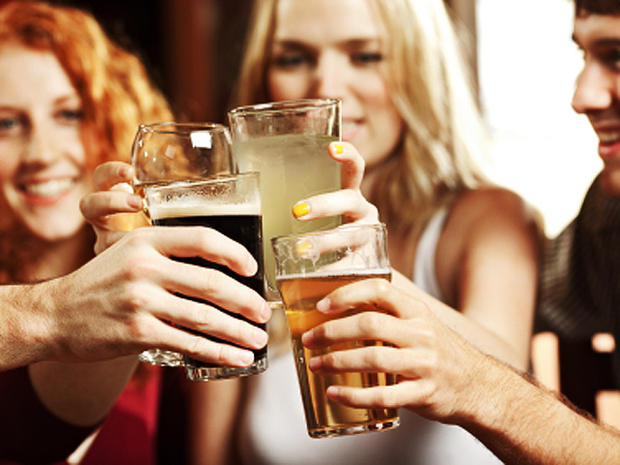Binge-drinking: Why hangovers and bad decisions don't stop us
(CBS) Ever swear off drinking while battling a nasty hangover? You're certainly not alone. Many drinkers experience regrets over one-night stands, shouting matches, and other drunken antics. So why do people continue to drink?
Psychologists may finally have found the answer. Simply put, binge-drinkers tend to remember the good times more than the bad.
"This study suggests why some people can experience a lot of bad consequences of drinking but not change their behavior," Dr. Kevin King, study co-author and assistant professor of psychology at the University of Washington, said in a university statement.
For the study - published in the June issue of Psychology of Addictive Behaviors - psychologists surveyed 500 college students, asking them about their past year's drinking habits - what they remember, anyway. The questions focused on how often a student experienced any of the 35 negative consequences of drinking the researchers picked, such as hangovers, lost belongings, and blackouts. The survey also looked at how often students experience any of the 14 positive effects, like better conversations, funnier joke-telling abilities, or more energy to dance and stay out late. The researchers then asked participants to rate how positive or negative these experiences were, and how likely they were to happen again.
What did they find? The college students rated the upsides to drinking as more positive, and more likely to happen in the future. And the researchers call this positive outlook "rose-colored beer goggles."
"It's as though they think that the good effects of drinking keep getting better and more likely to happen again," Diane Logan, study author and a UW clinical psychology graduate student, said in the statement.
And by letting the good times roll, some of these students lose perspective on the bad times. The psychologists found those that experienced small to moderate negative consequences from drinking didn't consider the episodes so bad, and didn't think they were likely to experience them again. The authors call this effect cognitive-dissonance reasoning.
"People think, 'It's not going to happen to me' or 'I'll never drink that much again.' They do not seem to associate their own heavy drinking with negative consequences," King said. But those students surveyed that reported the most negative consequences were more realistic, and rated those episodes as more negative, and more likely to happen again.
The authors hope their findings will influence alcohol counseling programs at universities. "We should take into account how people don't think of negative consequences as all that bad or likely to happen again," Logan said.
Consequences from drinking can go beyond embarrassment over saying something stupid the night before. According to CollegeDrinkingPrevention.gov, over 1800 college students die each year from drinking-related injuries. Another 600,000 are accidentally injured, while nearly 700,000 students are assaulted by another student that's been drinking.
To learn more, visit CollegeDrinkingPrevention.gov.

